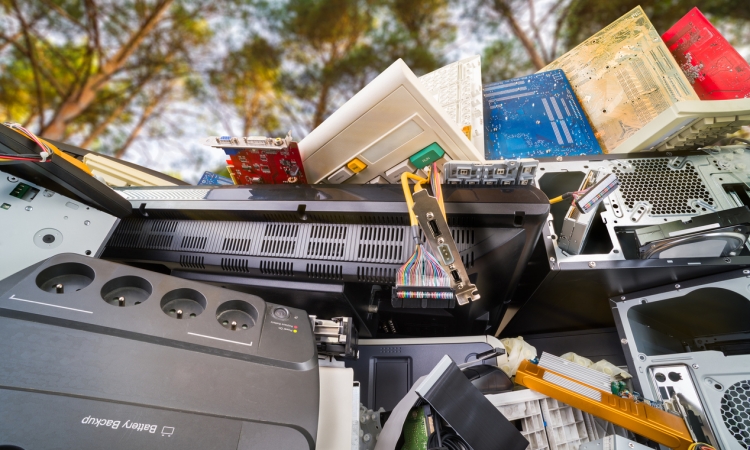As technology continues to advance, so does the amount of electronic waste (e-waste)—things like old computers, phones, and other devices we no longer use. These items can contain materials that are harmful to the environment and to our health if they aren’t recycled the right way. Proper e-waste recycling helps keep those substances out of landfills and protects both people and the planet.
JK Moving is committed to sustainable e-waste management, employing eco-friendly practices to mitigate the impact of decommissioned materials from data center servers. Our company adheres to environmental regulations and ethical practices in all of our recycling efforts.
Why data center electronics recycling matters
Data centers upgrade their equipment regularly, so a significant amount of old electronics get left behind. Recycling this equipment is key to protecting the environment and recovering valuable materials. When done right, hazardous substances stay out of the waste stream. E-cycling also supports a circular economy by reusing metals and other resources, reducing the need to mine or manufacture new ones.
What are the environmental impacts of improper disposal?
Improperly disposing of e-waste can release toxic substances and contribute to pollution and resource depletion. Adhering to stringent data center equipment recycling and waste management practices is crucial for minimizing environmental harm and maintaining data security.
The most common toxic substances found in e-waste include:
- Lead: Commonly used in soldering circuit boards and the glass of cathode ray tubes (CRTs). It poses significant health risks, particularly to the nervous system, and can cause developmental delays in children and reproductive issues in adults.
- Mercury: Often found in switches, relays, and fluorescent lamps used in electronic devices. Mercury exposure can lead to neurological damage and kidney failure, among other health problems.
- Cadmium: Present in rechargeable batteries, semiconductors, and color pigments used in displays. It is known to cause lung and prostate cancer, as well as kidney damage.
- Brominated Flame Retardants (BFRs): Added to plastic casings and circuit boards to reduce the risk of fire. They can leach into the environment and accumulate in organisms, posing health risks such as thyroid disruption and developmental issues.
- Polyvinyl Chloride (PVC): Commonly used in cables, insulation, and casings of electronic devices. When burned, PVC releases toxic chemicals such as dioxins and furans. Both are carcinogens and environmental pollutants.
- Arsenic: Used in semiconductors and in producing some types of glass. Prolonged exposure to arsenic can lead to skin lesions, cancer, and cardiovascular diseases.
To prevent the release of these toxic substances into the environment and minimize their impact on human health and ecosystems, e-waste must be properly handled and recycled.
JK Moving prioritizes environmentally conscious and sustainable processes in all of our operations, including the eco-friendly recycling of data center electronics. We focus on advanced technologies, regulatory compliance, and environmental stewardship.
The process of data center electronics recycling
Data center electronics recycling and disposal ensures the safe, environmentally responsible disposal of outdated electronic equipment. The decommissioning services process, from collection to recycling, minimizes environmental impact and maximizes material recovery.
- JK Moving collects and transports electronics from data centers to recycling facilities. The company utilizes specialized logistics and vehicles to securely transfer electronic waste, meticulously inventorying and packaging equipment.
 To maintain data security and privacy, JK Moving provides data destruction services. This includes data wiping, degaussing, and physical destruction, ensuring complete erasure of data in compliance with protection regulations.
To maintain data security and privacy, JK Moving provides data destruction services. This includes data wiping, degaussing, and physical destruction, ensuring complete erasure of data in compliance with protection regulations.- At the recycling center, skilled technicians disassemble electronic equipment, segregate components such as metals, plastics, and circuit boards, and properly handle hazardous substances.
- Post-dismantling, materials are sorted and separated using advanced technology to ensure efficient recycling and material recovery.
JK Moving complies with all environmental regulations, maintains high standards of e-waste management, and upholds its commitment to sustainability.
Conclusion
As technology advances, the production of electronic waste from data centers increases, presenting environmental challenges. Sustainable recycling methods help businesses reduce the environmental impact of e-waste as well as conserve resources.
Businesses must adopt sustainable e-waste management. Rising environmental consciousness means consumers expect companies to use resources responsibly and reduce their ecological footprint. Eco-friendly practices can improve a business’s reputation and market position.


